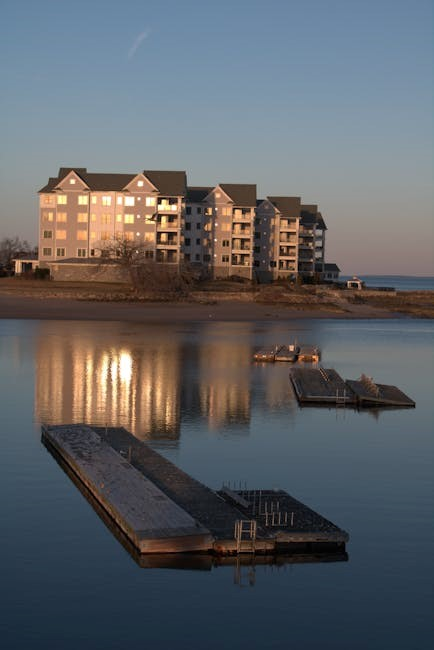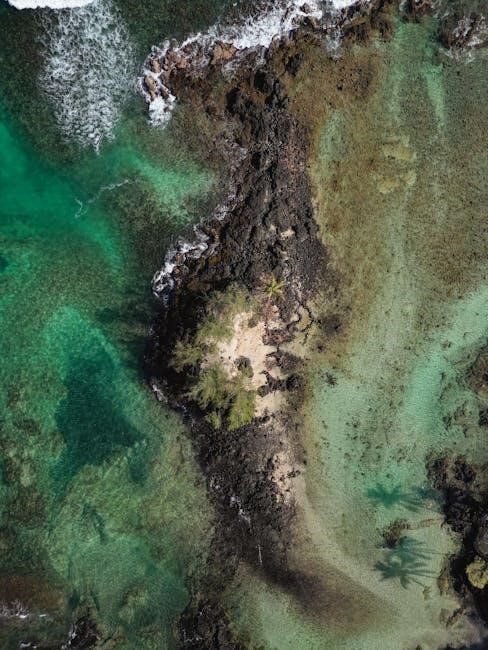Hawaii condos offer a unique blend of tropical living and modern convenience, appealing to both residents and vacationers․ Condo living in Hawaii provides stunning ocean views, lush landscapes, and vibrant cultural experiences, making it an attractive choice for those seeking a relaxed yet connected lifestyle․
1․1 What Makes Hawaii Condos Unique
Hawaii condos stand out for their prime locations, often steps from beaches, offering breathtaking ocean views and tropical landscapes․ Many feature modern amenities like pools, gyms, and spas, blending luxury with the laid-back island lifestyle․ The unique cultural vibe of Hawaii, combined with a mix of urban and natural settings, creates a one-of-a-kind living experience․ Additionally, the state’s limited land availability and high demand make condos a practical yet desirable housing option․ This blend of beauty, convenience, and exclusivity makes Hawaii condos truly special․
1․2 Benefits of Owning a Condo in Hawaii
Owning a condo in Hawaii offers numerous benefits, including stunning ocean views, proximity to beaches, and a vibrant cultural lifestyle․ Condo ownership provides a lock-and-go convenience, ideal for second-home buyers or investors․ Many condos feature resort-like amenities such as pools, gyms, and BBQ areas, enhancing your living experience; Additionally, Hawaii’s strong real estate market often appreciates, making condos a smart long-term investment․ With rental opportunities and tax benefits, owning a condo in Hawaii can be both financially rewarding and a gateway to island living at its finest․

Understanding the Hawaii Condo Market
The Hawaii condo market is dynamic and diverse, driven by high demand for limited land and growing interest in island living․ From affordable options to luxury properties, the market caters to various lifestyles and budgets, offering a mix of urban convenience and resort-style amenities, while reflecting the islands’ unique cultural charm and modern development․
2․1 Overview of the Current Market Trends
Hawaii’s condo market is experiencing steady growth, driven by high demand and limited inventory․ Current trends show increased interest in properties near beaches, urban hubs, and resort areas․ Prices have risen due to tourism recovery and remote work trends, with buyers prioritizing proximity to amenities․ The market remains competitive, favoring sellers, but buyers are benefiting from a wider range of condo options․ Sustainability and energy efficiency are becoming key factors, influencing both purchases and renovations․ As demand continues, the market is expected to remain robust, making it a prime time to invest in Hawaii condos․

2․2 Popular Condo Locations in Hawaii
Hawaii’s most sought-after condo locations include Oahu’s bustling Honolulu and Waikiki, known for luxury high-rises and oceanfront views․ Maui’s Kaanapali and Lahaina offer beachfront living, while Kauai’s Princeville provides secluded luxury․ The Big Island’s Kohala Coast and Hilo cater to diverse preferences, from resort-style condos to affordable options․ These locations blend stunning natural beauty with access to amenities, making them ideal for both full-time residents and vacationers․ Each area offers a unique lifestyle, whether you prefer vibrant city life or tranquil tropical settings․
2․3 Types of Condos Available
Hawaii offers a variety of condo options to suit diverse lifestyles and preferences․ Beachfront condos provide direct ocean access and stunning views, while inland condos are more affordable and often closer to urban amenities․ High-rise condos in cities like Honolulu offer modern amenities and panoramic views, whereas resort condos are ideal for vacationers, often featuring luxury amenities and services․ Additionally, there are condo-hotels that combine residential living with hotel-like services․ Each type caters to different needs, whether for permanent residence, vacation home, or investment property․
Factors to Consider When Choosing a Condo
Choosing the right condo involves balancing location, amenities, size, and budget to meet your lifestyle needs while ensuring long-term satisfaction and value in Hawaii’s unique market․
3․1 Budget and Financing Options
Setting a realistic budget is crucial when considering a Hawaii condo purchase․ Prospective buyers should evaluate savings, income, and debt to determine affordability․ Financing options include conventional loans, FHA loans, and cash purchases․ Mortgage pre-approval is essential to understand borrowing limits and secure favorable rates․ Additionally, buyers should account for down payments, closing costs, and ongoing expenses like HOA fees and property taxes․ Consulting a financial advisor can help navigate these complexities and ensure a smooth transaction․
3․2 Proximity to Amenities and Attractions
Proximity to amenities and attractions is a key factor in choosing a Hawaii condo․ Beaches, shopping centers, dining, and cultural sites are often nearby, enhancing convenience and lifestyle․ For tourists, being close to iconic spots like Waikiki Beach or Haleakalā National Park is a major draw․ Residents appreciate easy access to grocery stores, schools, and healthcare facilities․ Additionally, proximity to public transportation and airports can significantly impact daily life and travel plans․ Prioritizing location ensures that your condo aligns with your needs, whether for relaxation, adventure, or practical living․
3․3 Size and Layout of the Condo
When selecting a Hawaii condo, size and layout are crucial considerations․ Studios, one-bedroom, and multi-bedroom units cater to different lifestyles and needs․ Open layouts often maximize space, blending living, dining, and kitchen areas for a modern feel․ Larger condos may offer separate rooms for privacy, while smaller units emphasize efficiency․ Consider how the layout aligns with your daily routines, entertaining preferences, and storage requirements․ Natural light, window placement, and ocean views also impact the livability of the space․ Ensure the condo’s design supports your desired lifestyle and functionality․
3․4 Community and HOA Regulations
Hawaii condos often come with community and HOA (Homeowners Association) regulations that govern shared spaces, noise levels, and exterior modifications․ Understanding these rules is crucial for maintaining harmony within the community․ While they provide structure and protect property values, they may also limit certain freedoms․ Potential buyers should review the HOA’s governing documents to ensure compliance․ These regulations often include fees, which cover maintenance and amenities․ Balancing personal preferences with community guidelines is key to enjoying condo living in Hawaii’s unique and often close-knit neighborhoods․

Financing Your Hawaii Condo
Financing a Hawaii condo involves exploring mortgage options tailored to vacation or primary homes․ Buyers should budget for loan fees, property taxes, and insurance costs upfront․
4․1 Mortgage Options for Condo Buyers
Condo buyers in Hawaii have various mortgage options, including conventional, FHA, and VA loans․ Conventional loans are popular for primary residences, while FHA loans offer lower down payments․ VA loans are ideal for eligible veterans, requiring no down payment; Jumbo loans cater to higher-priced properties, common in Hawaii․ Buyers should consider down payment requirements, interest rates, and loan terms․ Comparing lenders and understanding the approval process is crucial, as condo financing may involve stricter guidelines․ Consulting a mortgage broker can help buyers navigate these options and secure the best fit for their needs․
4․2 Understanding Property Taxes and Insurance
Understanding property taxes and insurance is essential for Hawaii condo ownership․ Property taxes are based on the assessed value of the condo and vary by island and location․ Insurance costs depend on factors like the condo’s value, location, and risk factors such as natural disasters․ Condo owners typically need both homeowner’s insurance and coverage provided by the HOA․ It’s important to review insurance policies to ensure adequate protection․ Buyers should also consider how property taxes and insurance costs may increase over time, impacting long-term affordability and budget planning for their condo investment․
4․3 Additional Costs to Consider
When purchasing a Hawaii condo, it’s essential to consider additional costs beyond the purchase price; These include maintenance fees, which cover building upkeep, and special assessments for unexpected repairs․ Property taxes and insurance premiums, while mandatory, can vary depending on location and value․ Utility bills, including water and electricity, add to monthly expenses․ Additionally, some condos charge for parking, storage, or amenities․ Understanding these costs helps buyers budget effectively and avoid financial surprises․ HOA fees and other recurring charges should be carefully reviewed before finalizing a purchase․

The Homebuying Process in Hawaii
The homebuying process in Hawaii involves a series of streamlined steps, from initial research to closing, tailored to the unique island real estate market and regulations․
5․1 Finding the Right Real Estate Agent
When searching for a real estate agent in Hawaii, prioritize local expertise and experience with condos․ Look for agents familiar with the island’s market trends, condo regulations, and neighborhood dynamics․ They should have a proven track record in negotiating condo sales and understand the unique challenges of island living․ Ensure they are licensed and have excellent communication skills to guide you smoothly through the process․ Asking for referrals and checking online reviews can help you find a trusted professional who aligns with your needs and preferences․
5․2 Making an Offer and Negotiating
Making an offer on a Hawaii condo requires careful preparation and strategic negotiation․ Work closely with your real estate agent to understand the market value and set a competitive price․ Include contingencies for inspections, financing, and appraisals to protect your interests․ Negotiation may involve counteroffers, so stay flexible and patient․ Your agent can help communicate your terms effectively, ensuring a smooth and successful transaction․ A well-crafted offer and skilled negotiation are key to securing your ideal condo in Hawaii’s competitive market․

5․3 Inspections and Due Diligence
Inspecting a condo in Hawaii is crucial to ensure it’s a sound investment and meets your needs․ Hire professionals to check for structural issues, termite damage, and mold․ Review the condo’s maintenance history and assess any needed repairs․ Additionally, examine the building’s common areas and verify compliance with local regulations․ Conduct thorough due diligence on the HOA, including financial health and any pending legal issues․ Understanding the property’s condition and potential hidden costs can prevent future headaches and ensure a smooth ownership experience․
5․4 Closing the Deal
Closing the deal on a Hawaii condo involves finalizing the purchase through legal and financial processes․ This includes signing the purchase agreement, transferring ownership, and completing payment․ A title company typically facilitates the transaction, ensuring all documents are executed correctly․ Buyers receive the keys upon completion, marking the official transfer of property․ It’s essential to review all closing documents carefully and ensure all terms are met before finalizing․ Professional guidance from real estate agents, attorneys, and escrow officers helps streamline the process and avoid delays․
Legal and Financial Considerations
Understanding Hawaii’s legal and financial aspects is crucial for condo buyers․ Property laws, tax implications, and HOA regulations require careful review to ensure compliance and financial security․

6․1 Understanding Condo Association Fees
Condo association fees in Hawaii are monthly or quarterly charges that cover shared expenses, such as building maintenance, landscaping, and amenities like pools or gyms․ These fees vary depending on the condo’s size, location, and services offered․ They may also include utilities, insurance, and reserves for future repairs․ While these fees can seem like an extra cost, they ensure the property remains well-maintained and provide convenience for residents․ Understanding these fees is crucial to budgeting and ensuring a smooth living experience in your Hawaiian condo․
6․2 Reviewing the Condo’s CC&Rs
Reviewing a condo’s CC&Rs (Covenants, Conditions, and Restrictions) is crucial for understanding the rules and regulations governing the property․ These documents outline permissible property uses, architectural guidelines, and rules for common areas․ They may also include restrictions on parking, pets, and renovations; CC&Rs can significantly impact your ownership experience, so it’s essential to carefully review them before purchasing․ Ensure you understand all terms to avoid future disputes or penalties․ Consulting with a real estate attorney can help clarify complex language and ensure compliance with all regulations․
6․3 Tax Implications of Condo Ownership
Owning a condo in Hawaii comes with specific tax considerations․ Property taxes are generally lower than in mainland states, but rates vary by island and location․ Condo owners may also benefit from mortgage interest and property tax deductions if they itemize․ Additionally, Hawaii offers exemptions for primary residences and potential tax credits for energy-efficient upgrades․ However, condo association fees are not tax-deductible․ It’s essential to consult a tax professional to navigate Hawaii’s unique tax laws and ensure compliance with state and federal regulations․

Maintaining Your Hawaii Condo
Regular inspections and proactive maintenance are crucial to preserve your condo’s value and functionality․ Address issues like rust, mold, and pest infestations promptly to ensure longevity and comfort․
7․1 Regular Maintenance and Repairs
Regular maintenance is essential to preserve the value and functionality of your Hawaii condo․ Exterior upkeep, including painting and roof inspections, should be scheduled annually to combat Hawaii’s salty, humid climate․ Common areas like pools, gyms, and landscaping require consistent attention to maintain aesthetic appeal․ Plumbing and electrical systems should be inspected regularly to prevent leaks and electrical issues․ Additionally, pest control is crucial due to Hawaii’s tropical environment․ Addressing repairs promptly can prevent costly damage and ensure a safe, comfortable living space․ HOA fees often cover shared maintenance, but homeowners should also budget for personal unit repairs․
7․2 Handling Pest Control and Environmental Concerns
In Hawaii, condos require proactive pest control due to the tropical climate, which attracts insects like termites, ants, and cockroaches․ Regular inspections and preventative measures, such as sealing entry points and using eco-friendly treatments, are essential․ Additionally, environmental concerns like humidity, mold growth, and saltwater damage must be addressed to maintain the condo’s integrity․ Property managers often recommend pest control services and moisture-resistant materials to safeguard investments․ Staying informed about local regulations and adopting sustainable practices can help condo owners protect their units and the surrounding environment effectively․
7․3 Upgrading and Renovating Your Condo
Upgrading your Hawaii condo can enhance its value and comfort․ Popular renovations include modernizing kitchens, updating bathrooms, and installing energy-efficient appliances․ Sustainability-focused upgrades, like solar panels or rainwater systems, are increasingly popular․ When renovating, ensure compliance with HOA regulations and local building codes․ Hiring licensed contractors familiar with Hawaiian construction standards is essential․ Consider incorporating local design elements to maintain the island aesthetic․ Regular maintenance and strategic upgrades can preserve your condo’s beauty and functionality while appealing to future buyers or renters․

Owning a Condo as an Investment
Investing in a Hawaii condo offers lucrative opportunities, particularly through vacation rentals; High demand, property appreciation, and tropical appeal make condos a smart choice for generating income and building wealth․

8․1 Rental Opportunities in Hawaii
Hawaii’s thriving tourism industry creates robust rental opportunities, especially for condos in prime locations like beachfronts or resort areas․ Short-term vacation rentals are in high demand, attracting travelers seeking luxury and convenience․ Many condo complexes cater to this market, offering amenities like pools, gyms, and concierge services․ Additionally, long-term rentals are viable, particularly in urban areas like Honolulu, where professionals and families seek modern living spaces․ With Hawaii’s limited housing supply and high demand, condo ownership can provide significant rental income, making it a lucrative investment opportunity in one of the world’s most desirable locations․
8․2 Managing a Vacation Rental Property
Managing a vacation rental in Hawaii requires careful planning and attention to detail․ Understanding local regulations is crucial, as each island has specific rules for short-term rentals․ Hiring a professional property management company can streamline tasks like booking, cleaning, and maintenance․ Effective marketing through platforms like Airbnb and VRBO is essential to attract guests․ Additionally, screening potential renters and maintaining clear communication ensures a smooth experience․ Regular property inspections and addressing guest concerns promptly can enhance reputation and repeat business․
- Stay compliant with local rental laws and permits․
- Invest in quality furnishings and amenities to attract higher-paying guests․
- Consider hiring a property manager for hands-off ownership․
Proper management can turn your condo into a lucrative investment while providing memorable stays for visitors․
8․3 Potential Challenges of Investment Ownership
Investing in a Hawaii condo comes with unique challenges, including high operating costs, strict regulations, and market fluctuations․ Property management can be complex, especially for absentee owners․ Rental demand may vary seasonally, and natural disasters pose risks․ Additionally, HOA fees and insurance costs are often higher in Hawaii․ Maintenance and repairs can be costly due to the island location․ Understanding local laws and tax implications is crucial․ While the potential for high returns exists, careful planning and ongoing management are essential to navigate these challenges successfully and ensure long-term profitability․
Hawaii condos offer a unique lifestyle blending tropical beauty with modern convenience․ Whether for residency or investment, they provide lasting value in one of the world’s most stunning locations․
9․1 Final Tips for Prospective Buyers
Prospective buyers should thoroughly research Hawaii’s condo market, considering factors like location, budget, and long-term goals․ Work with a trusted real estate agent familiar with local trends and regulations․ Inspect the condo and building for any potential issues, and review HOA fees and rules․ Understand financing options and secure pre-approval before making an offer․ Plan for additional costs, such as property taxes and maintenance․ Finally, evaluate the neighborhood for amenities, safety, and future growth potential․ Making an informed decision ensures a smooth and rewarding ownership experience in Hawaii․
9․2 The Future of Condo Living in Hawaii
The future of condo living in Hawaii is promising, with increasing demand for sustainable and smart living spaces․ As the state focuses on eco-friendly practices, condos are likely to feature energy-efficient designs and green technologies․ With tourism growth, vacation rental condos will remain popular, while locals will seek affordable options in urban areas․ Community-centric developments and innovative amenities will shape the market, attracting both residents and investors․ However, balancing affordability with luxury and addressing regulatory challenges will be key to maintaining Hawaii’s condo market appeal in the coming years․
